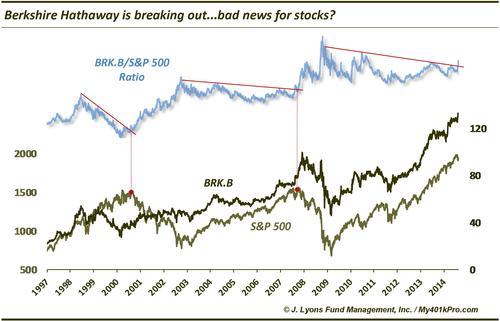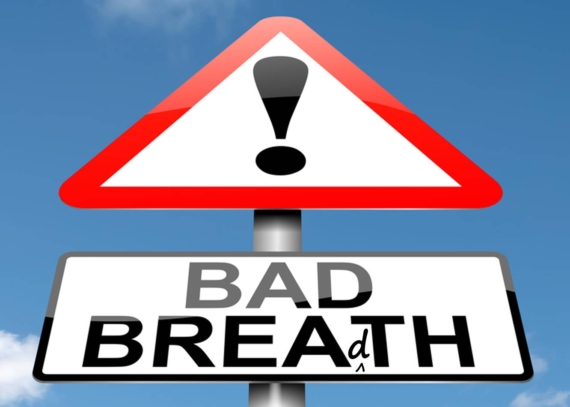Berkshire Hathaway is breaking out…bad news for stocks?
Sounds crazy, I know – that a stock breaking out might be sending a bearish signal for the stock market. It probably sounds particularly heretical on a day that Berkshire Hathaway A shares cross above $200,000 for the first time. It does make some intuitive sense, however, particularly considering this is not your everyday stock we’re talking about. First, here’s the Chart Of The Day, plotting the stock of Berkshire Hathaway BRK.B (B shares) along with the S&P 500. Also plotted is the relative ratio between the two.

As the chart shows, BRK is breaking out to an all-time high on an absolute basis. Nothing wrong with that. In fact, it’s the kind of setup we would be buying. It is the relative breakout here in August 2014 that is the possible red flag. Note the timing of the previous two relative breakouts in BRK: August 2000 and August 2007. While the breakouts have occurred every seven years in the month of August, we’re going to chalk that up to coincidence. The concerning aspects has to do with the fact that the last two relative breakouts essentially marked the last two cyclical stock market peaks.
Perhaps that timing is merely a coincidence as well. However, perhaps there is a deeper meaning behind the signal, one that probably tells us more about the state of the overall market than it does about Berkshire Hathaway. Consider Warren Buffet’s investment style. He seeks out long-term deep value when considering investments. If company valuations are too rich, he will sit on his hands instead of over-commiting himself. Therefore, towards the end of a momentum-filled, multiple expansion-driven bull market, Berkshire Hathaway will likely underperform. However, once the air comes out of the bubble and valuations revert lower, Mr. Buffet’s investment style would naturally outperform on a relative basis. That essentially explains the timing of the relative breakouts in Berkshire Hathaway versus the S&P 500.
In August of 2000, Berkshire Hathaway bottomed after a period of poor performance, even on an absolute basis, that had some questioning if Mr. Buffet still had it (how silly does that seem now?). In reality, it was more of a comment on how truly historic the dotcom bubble was when the Nasdaq went to astronomical heights even as most stocks were experiencing a bear market. Once the bubble burst, Berkshire’s blue chip value holdings began to do well and far outperform the S&P 500.
In August of 2007, a similar relative breakout occurred. However, it wasn’t simply a matter of the frothy market rolling over. Berkshire Hathaway broke out on an absolute basis as well, just as the cyclical bull market was ending. A combination of strong gains in BRK for several more months and the onset of the financial crisis led to a period of outperformance.
Similar to 2007, Berkshire Hathaway’s stock is breaking out now and has been so strong of late that it is also breaking out on a relative basis versus an S&P 500 that has hardly been dented, yet. It certainly is possible that the two could continue higher in lock step. However, there are a few concerns that mirror the circumstances the last two times Berkshire Hathaway broke out. For one, the market is unquestionably overvalued on any reasonable metric. While that may not be a trigger for a market top, it certainly is a condition. Secondly, and this goes along with that, Mr. Buffett is currently sitting on a record amount of cash. What does that say? It tells us that he feels the same way about the market’s current valuation, just as he did in 2000 and 2007.
It also tells us that, despite sitting on record levels of cash, to have Berkshire Hathaway breaking out on both a relative and absolute basis, Mr. Buffett still has it.


